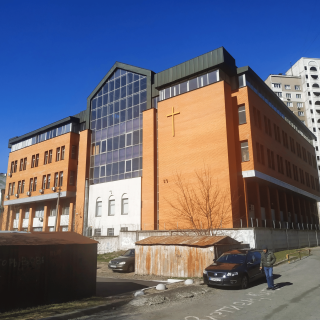
Adjusting to New Realities
During the last 29 years, Ukrainian professors and SEND missionaries have taught and trained the next generation of pastors and ministry leaders at Kyiv Theological Seminary (KTS). The need to equip believers has not changed in the last two years; in fact, the need has become more critical.
When the war started on February 24, 2022, KTS had already cancelled all courses, and most faculty had evacuated the city. The KTS leadership prayerfully evaluated the regional landscape: hundreds of evangelical pastors had left the country. Many churches lost 50-75% of their members! Many young people remained, while much of the elder leadership left. What could KTS do? Throwing in the towel was not an option.
The need for pastoral leadership training was acute. However, the standard four-year bachelor programs would take too long. A two-year, seminar-based pastoral program was adopted. The program is called “Linteum” - Latin for “towel”, like that used by Jesus to wash His disciples’ feet. The model was quickly adapted to a one-year, seminar-based training for Sunday School teachers and youth pastors. Praise the Lord! The program filled a gap in discipleship ministries, and over 160 people participated!
After the first year, many leaders asked KTS to start these programs at their seminaries, Bible Institutes, and regional Bible colleges. Additionally, KTS added four new Certificate programs in Evangelism & Discipleship, Biblical Counseling, Women’s Ministries, and Chaplaincy. In the fall of 2023, over 300 students studied in the Certificate programs! Already some of those graduates have enrolled in KTS’s Bachelor programs. These developments will not make up for the loss of mature elders, but are a step in the right direction.

There is no doubt that the professors for the Certificate programs are feeling the strain from the extra teaching.
The seminary’s resources are stretched thin. However, Jesus told us to make disciples to the end of the age. How we make disciples may change, but not the need to make them. Discipleship in Ukraine – with tragedies abounding – is needed now more than ever. And God has enabled the leadership of KTS to adjust and help meet that pressing need.
Additional Posts




